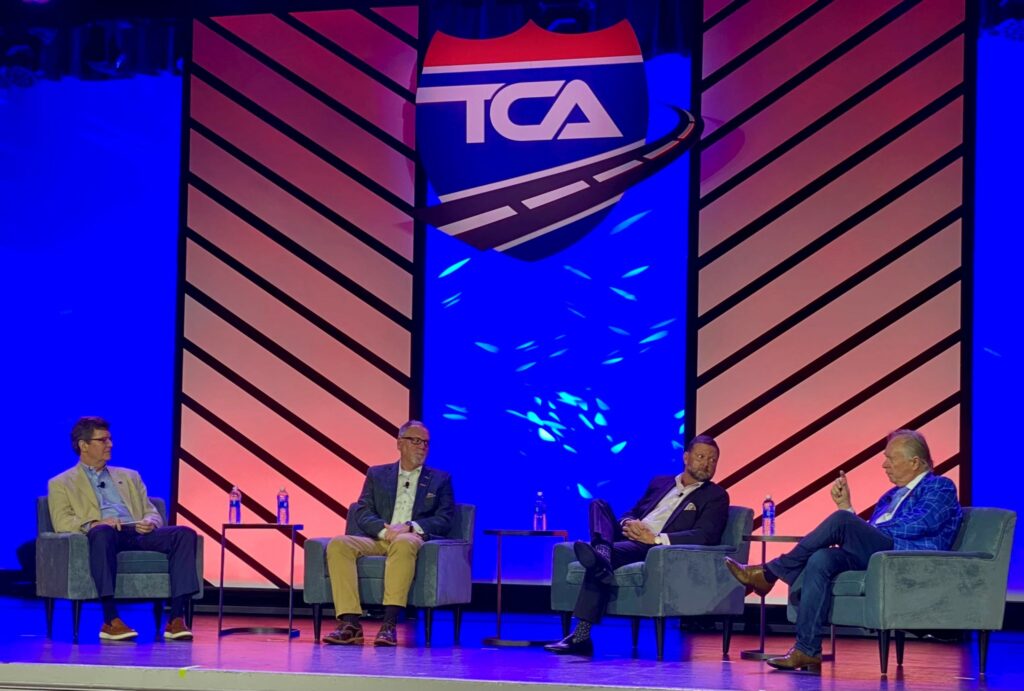Large carriers face regulatory, market challenges
Regulation is bogging down trucking and the sector is bombarded with issues, according to an industry leader. “In Canada, we’re seeing a move towards telling us what to do all the time,” said Murray Mullen, chairman, senior executive officer and president of Mullen Group during Truckload Carriers Association’s annual Truckload 2024 in Nashville, Tenn.
Mullen added trucking will always be subject to regulation and oversight, but it takes away from entrepreneurialism and the very essence of capitalism. “They’re trying to regulate us into doing something that we all have to do exactly the same thing at the same time.”
Jim Richards, president and CEO of KLLM Transport Services said while some regulations are positive, like those focused on safety, others are not. During a panel discussion on challenges large carriers face, he said other regulations like those facing independent contractors, make it difficult to strategize on whether carriers should focus on company drivers or go the independent contractor route.

Touching on the freight market, Richards said he’s been in the business for 37 years and this has been the most challenging time he’s witnessed. Freight levels are low, and carriers can’t go to customers for higher rates, while costs have seen double digit increases.
Mullen added that it is going to be tough for a while and owners should run their businesses accordingly. “For those who can survive it, you are gonna be fine,” he said.
Mark Rourke, president and CEO of Schneider National, put a positive spin on the situation. He said since information is moving quickly things will also turn around faster. Shippers and carriers will react quickly to the situation as things improve.
Mergers and acquisitions
The three executives had different perspectives on the mergers and acquisitions scenario.
Richards said his company is picky when making acquisitions, and the three he’s done have worked out well. The company’s culture is the focus when making an acquisition, he added.
Mullen said at present, with high interest rates, strategy and timing are key for acquisitions. If the balance sheet is overleveraged, the company could be put in peril, he warned.
Rourke sees an attractive M&A period ahead and is optimistic about the back half of 2024 and in 2025.
Zero-emission vehicles
Regarding zero-emission vehicles, Rourke said he supports environmental protection; however, timelines and capabilities are very important. Schneider National is pursuing some of the technology in a local environment. He added the technology is not there yet for longhaul applications.
It is hard enough to get customers to pay a good price at present, how is a carrier going to pass along the price of zero-emission vehicles to them? he noted.
Mullen said the industry is on the cusp of a major change, but technology must catch up to philosophy. “It costs more, how are we going to pay for it? The magic is yet to be seen on reducing cost. The purest zero-emission technology is so expensive, it is not practical,” he said.
Technology
As for technology in trucks, those focusing on safety and saving lives are a no-brainer for Richards. For him, cameras are game changers that provide real-time feedback and are a great training tool for drivers.
Rourke’s company has been deploying the MirrorEye camera system that does away with traditional mirrors. The cameras have helped increase visibility around the vehicle and reduce nighttime fatigue issues by cutting out glare.
Mullen’s focused on improving the flow of data between customer, carrier and driver. He added that customers also want access to data with as little human interaction as possible.
Have your say
This is a moderated forum. Comments will no longer be published unless they are accompanied by a first and last name and a verifiable email address. (Today's Trucking will not publish or share the email address.) Profane language and content deemed to be libelous, racist, or threatening in nature will not be published under any circumstances.
When are the governments both Canada and the US going to realize that the timelines they have are rediculous. Especially when the technology is not progressing at the same rate. let get units on the road
in all weather conditions in all terrain and maximum distances driven to make sure the trucks are capable to pul a diesel unit off and replace it with a hybrid of some sort . why drive cost up so quickly before they need to be , the gov. has deep pockets they need to realize that the sectors they try to run are better at running it than they are .